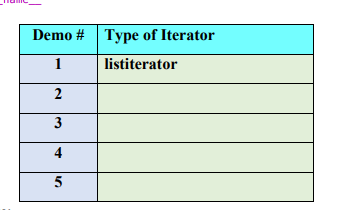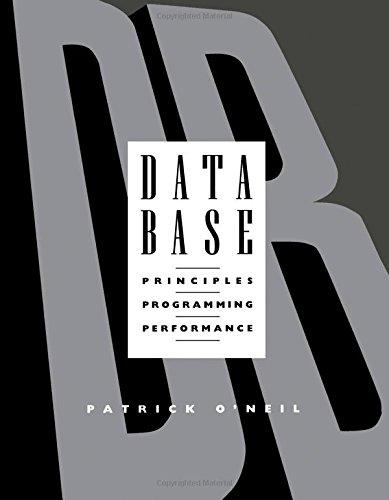Question
a. run demo1() which illustrates these points. Now add one more print my_iterator.next() at the end of demo1() and run it again. You should see
a. run demo1() which illustrates these points. Now add one more print my_iterator.next() at the end of demo1() and run it again. You should see a StopIteration exception.
b. Comment out all the lines: print my_iterator.next() and replace them with:
for item in my_iterator: print item
How about this? Will it also work?? for item in my_list: print item
c. Study all five demos. Demos 2, 3, 4 and 5 show that we can use a for loop to iterate through all the items in a list, a tuple, a string and a dictionary. These are all Iterable. For each of these demos, we directly placed the object under test inside the for loop to iterate through its items. The for loop kindly build an iterator for the object for us all behind the scenes.
For example, in demo2() we stepped through the items in the list named list1as follows.
for i in list1: time.sleep(0.2) print(i)
Comment out the for loop and replace it with a new for loop, which directly uses an iterator. Also print out the type of the iterator returned by iter().
my_iterator = iter(list1) print "The method 'iter' returns an object of type: %s." % type(my_iterator).__name__ for item in my_iterator: time.sleep((0.2) print item
Record the type of iterator returned by iter() for each demo using the exact name returned by type(my_iterator).__name__
################# Fill in this chart!!! #################

d. Here is a dictionary of function references for all five demos.
function_dictionary = {1:demo1, 2:demo2, 3:demo3, 4:demo4, 5:demo5}
# add a for loop to iterate through the function dictionary and call each function
# This should run all five demos one after the other. We iterated through the Iterable demos!
# paste your code to do that here.
Code:
# Examples of built-in iterators import string import time def demo1(): # The builtin function iter takes an iterable object and returns an iterator. print " DEMO1: The builtin function 'iter' takes an iterable object and returns an iterator." print "The type of 'iter' itself is: %s." % type(iter).__name__ test_object = [1, 2, 3, 4] # a list is iterable print "The test object %s has type: %s" % (repr(test_object), type(test_object).__name__) # Now construct a listiterator for the list. my_iterator = iter(test_object) # my_iterator = test_object.__iter__() # an alternative and equal call print "The method 'iter' returns an object of type: %s." % type(my_iterator).__name__ print "The original list: ", test_object print "It's iterator", my_iterator print my_iterator.next() print my_iterator.next() print my_iterator.next() print my_iterator.next() # add one more call to next() to crash your program and see the StopIteration # Then comment out all the above calls to next() # and replace them with a single for loop def demo2(): # Iterating over a list generated from a string after removing punctuation print " DEMO2: List Iteration" einstein_quote = "Imagination is more important than knowledge. Knowledge is limited. Imagination encircles the world." einstein_quote = einstein_quote.translate(None, string.punctuation) list1 = einstein_quote.strip('.').split() print "Our list is:", list1 for i in list1: time.sleep(0.2) print(i) # Comment out the for loop and replace it with a new for loop, which directly uses an iterator. # Also print out the type of the iterator returned by iter(). def demo3(): # Iterating over a tuple (immutable) print " DEMO3: Tuple Iteration" tuple1 = ("Commencing countdown, engines on.", 10, 9, 8, 7, 6 , 5, 4, 3, 2, 1, 0, "Liftoff!" ) print "Our tuple is:", tuple1 for i in tuple1: time.sleep(0.2) print(i) # Comment out the for loop and replace it with a new for loop, which directly uses an iterator. # Also print out the type of the iterator returned by iter(). def demo4(): # Iterating over a String print(" DEMO4: String Iteration") string1 = "Ectoplasm Manipulation" print "Our string is:", string1 for ch in string1: time.sleep(0.2) print(ch) # Comment out the for loop and replace it with a new for loop, which directly uses an iterator. # Also print out the type of the iterator returned by iter(). def demo5(): # Iterating over dictionary print(" DEMO5: Dictionary Iteration") d = dict() d['xyz'] = 123 d['abc'] = 345 for i in d: print("%s %d" % (i, d[i])) # Comment out the for loop and replace it with a new for loop, which directly uses an iterator. # Also print out the type of the iterator returned by iter(). if __name__ == "__main__": demo1() # explore all five demos - one at a time function_dictionary = {1:demo1, 2:demo2, 3:demo3, 4:demo4, 5:demo5} # Let's get cute! # Add a for loop to iterate through the function dictionary, and call each function # This should run all five demos one after the other. Demo # Type of Iterator istiterator
Step by Step Solution
There are 3 Steps involved in it
Step: 1

Get Instant Access to Expert-Tailored Solutions
See step-by-step solutions with expert insights and AI powered tools for academic success
Step: 2

Step: 3

Ace Your Homework with AI
Get the answers you need in no time with our AI-driven, step-by-step assistance
Get Started


